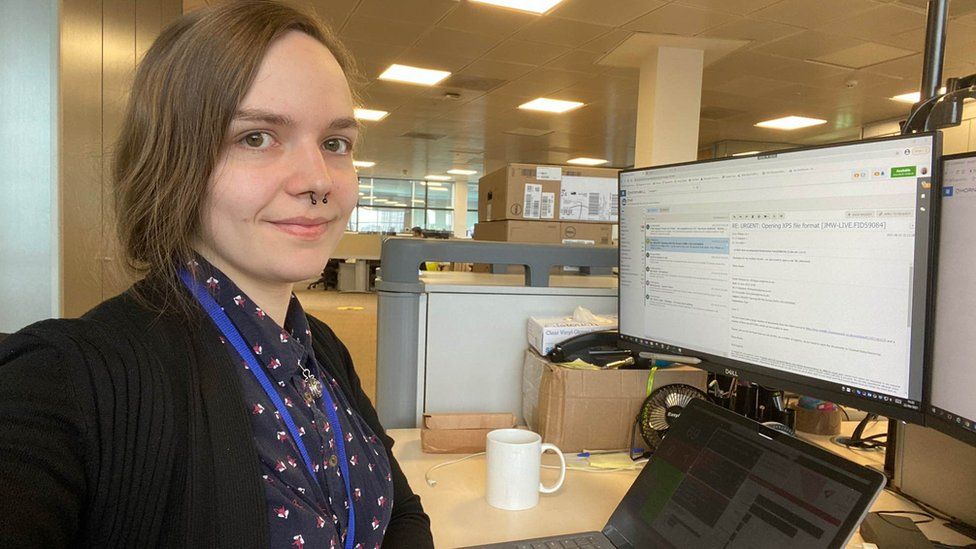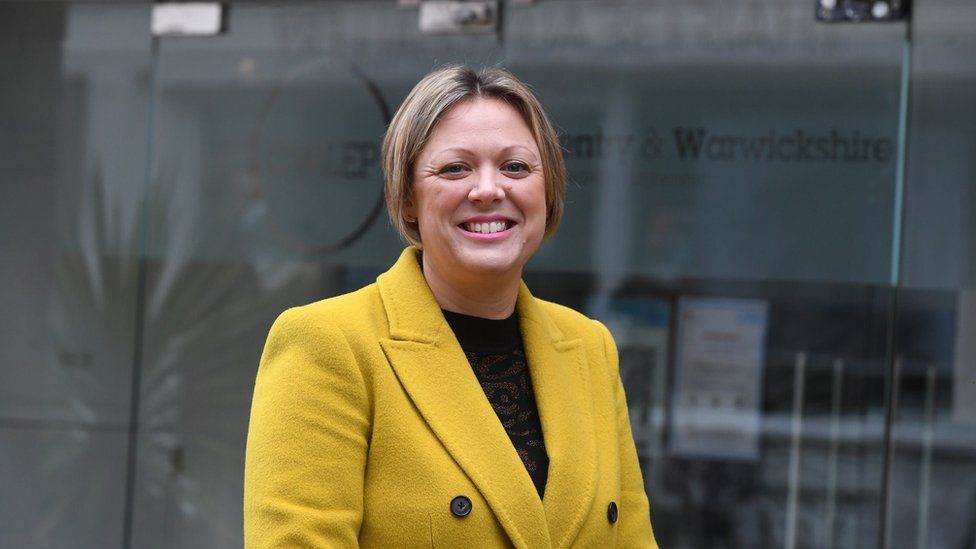
The news that dating app Bumble is to close its offices for a week to allow its staff to recover from "collective burnout" has pushed the issue of worker stress into the limelight.
Bumble told its 700 global workers to focus on themselves following a busy year that saw the company launch on the US stock market.
But the disruption and uncertainty caused by the Covid pandemic over the past 15 months has led workers at many companies to feel stressed and exhausted.
Daily life has been uprooted and the lines between work and leisure blurred.
So how have workers coped when they are feeling burnt out?

'I try to keep work and time off separated'

"Burnout comes with the job because it's very fast paced so you often feel it," says Amy Hanson, who works as an IT helpdesk assistant at JMW Solicitors in Manchester.
Amy now works in the office full-time again, but through the pandemic says she has "got fatigued with low energy and sort of forgot how to talk to people".
"I struggle with stress quite often so try to keep work and time off separated."
Amy turns her phone off after work and tries to take "each task one by one" to help with overwhelming feelings.
Her employer also has an online counselling portal for staff and Amy has used NHS guidance for help.
As another way to cope with stress, Amy has taken up a hobby of repairing gaming hardware which she finds "very relaxing".

'I knew I needed to get outside'

Sarah Windrum runs an IT support business called the Emerald Group, which employs 20 people based in Warwickshire.
Since the pandemic started, Sarah has tried to encourage her employees to talk about their struggles and challenges.
"We can't offer holiday like Bumble, but we do try to have an open and honest conversation with staff and try to make sure that everyone is cared for," she explains.
"We recently had one member of staff that needed more time off to care for an elderly parent so the rest of us took up the slack and I try to tell everyone that we can all help each other out like this."
Sarah also felt this pressure herself. She noticed she was continually returning to her laptop, whether it was after dinner or after putting the children to bed.
"I was aware of my behaviour and I just didn't have the energy. I had to be mindful of the pressures," she says.
Sarah saw that she "needed some time away" and started walking beside the Warwickshire canals to get away from work.
"The walks are so rejuvenating, I knew I needed to get outside in some proper space".

How to deal with burnout
The key to coping with burnout is control, according to experts. "Not everyone has the option of leaving their job but it's about doing what you can with the things you can control," says Siobhan Murray, author of The Burnout Solution.
Cary Cooper, president of the Chartered Institute of Personnel and Development and professor of organisational psychology and health at the University of Manchester, says it is "important that individuals take control of their environment to manage the hours they work and ensure that they're socially connected".
He advises:
- take control
- don't work consistently long hours
- engage in activities unrelated to work
- connect socially with friends and people you like
- have some "me time"
- avoid unhealthy behaviours and negative coping mechanisms
- help other people
- be positive
But companies must play their part too, says Trades Union Congress health and safety officer Shelly Asquith. Stress is an "occupational hazard", she says and it "requires risk assessment and management to protect the well-being of staff".
Prospect union general secretary Mike Clancy says: "Mental health is finally starting to be given parity of esteem with physical health and with this should also come the recognition of mental health within health and safety by all employers.
"Even before the pandemic, mental health was the most common cause of work-related ill-health. This is very much an industrial issue and it needs to be treated as such."

'It's really important to open up'
Italia Jensen works as head of youth voice at The Mix - a young person's digital support charity. Italia says she knew the warning signs of burnout having suffered from it when she was younger, so when the symptoms returned she took a week off as sick leave.
"I was feeling really stressed, emotionally exhausted and tired at work," she says.
Through the lockdown, she started taking longer lunch breaks and running, which Italia says "really helped" her feel less stressed.
"It took some getting used to, but I had to get better at asking for help when feeling stressed," she adds.
"You need to remember you work in a team and are connected to people."
At the end of the day, her team began to do a check-in which she says "gave us space to see how each other were doing".
"It can creep up on you if you don't know what it looks and feels like, so it's really important to open up so people don't carry the stigma," she adds.

'I feel better than ever'

Harry Fish from Nottingham works in software implementation. Prior to lockdown, he spent seven years frequently travelling around the country to visit customers. Now, he works remotely full-time and says he's feeling "better than ever".
In February, figures from the Royal Society for Public Health indicated that, overall, more people felt working from home was better for their health and wellbeing. Forty-five percent of those polled thought working from home was better for them, compared with 29% who thought it was worse.
"I had a good work-life balance before, but now I've realised what I was missing," Harry says.
He exercises every day before starting work and says this has "invigorated" his work day, which otherwise would have been spent commuting. He has done 10,000 steps a day for a year as a result.
"From a work perspective, productivity has increased with more focus, and having the flexibility to organise a work day more efficiently."
"Self reflection is easier, rather than having unnecessary social pressures influencing decisions," he adds.

"work" - Google News
June 28, 2021 at 07:39AM
https://ift.tt/3x0lj8U
Pandemic work stress: How I learned to deal with it - BBC News
"work" - Google News
https://ift.tt/3bUEaYA
Bagikan Berita Ini














0 Response to "Pandemic work stress: How I learned to deal with it - BBC News"
Post a Comment